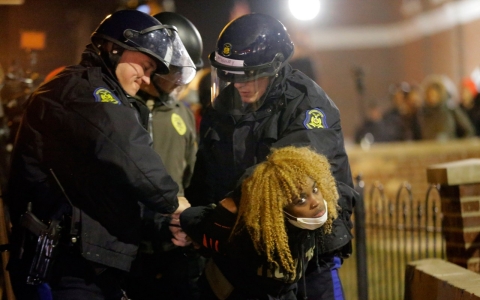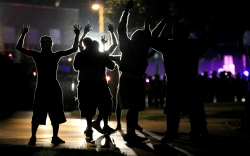Black empowerment advocates across the country say there's no reason to restrict themselves to lawful protest after a Ferguson grand jury decision not to indict Darren Wilson — a white police officer who shot and killed unarmed black teenager Michael Brown. The rebellion and socialist politics of the 1960s and Black Power movement of the 1970s, often discounted and downplayed by contemporary rights advocates, offer alternatives for black political participation, they say.
“There has been an all-out assault on the black radical tradition as a viable tradition” in recent years, said Eddie Glaude, Jr., chair of the Center for African American Studies at Princeton University.
Still, “there is a tradition of black politics that isn’t, shall we say, committed to channeling black political behavior solely to elections, being the left wing of the Democratic Party.”
President Barack Obama’s oft-lauded address of Aug. 28, 2013, on the 50th anniversary of Martin Luther King, Jr.’s “I have a dream” speech at the Washington Mall, exemplifies how proponents of the black empowerment movement can downplay the role of rebellion in acquiring black freedoms, activists say.
In his speech, Obama said the riots that swept the country were “self-defeating.” “Legitimate grievances against police brutality tipped into excuse-making for criminal behavior,” Obama said.

Advocates say data on law enforcement-caused homicides is incomplete and the actual numbers may be higher than believed

Anger over grand jury’s decision remained, but many were ‘not here for violence. We’re here for peace’
But significant political gains were made in response to the protests of the 1960s, said Gaude. “Those rebellions had concrete political implications for how the nation understands the urgency of the movement,” he said.
In response to those protests, President Lyndon Johnson established the National Advisory Commission on Civil Disorders, known informally as the Kerner Commission in 1967. It made policy recommendations on the underlying reasons for racial unrest that made evident to policymakers the overwhelming social and economic disparity between the nation’s whites and blacks.
And despite what gains were made, the rebellions still face criticism from the president and even members the black power movement, as Ferguson organizers continue to call for calm.
“What we have now is a characterization of lawlessness and criminal behavior, because we have narrowed our idea of black political behavior,” Gaude said, adding that on Monday night Obama offered more of the same.
“When black folks step out of the orbit of white folks’ expectations, all hell breaks loose,” Gaude said.
But after the grand jury decision, there’s no point, many activists say, in working within a legal system that they no longer feel works for them, and the options for black political participation has been "narrowed" by people focused on being polite and garnering the support of non-black Americans.
“People last night who were on the fence on whether the system would work, many said, ‘no, this is not going to work,’ ” said Jessie, a Ferguson protester who requested anonymity because fellow protesters identified by the media have been targeted by the police.
“People across the nation are finally waking up and seeing that the system doesn’t work for us,” Mollie Costello, a prominent anti-police brutality activist in Oakland, California, said in a phone interview.
In Rocky Mount, North Carolina, Shafeah M’Balia, a 61-year-old activist with the advocacy group Black Workers for Justice, says that for many young people, Monday’s ruling in Ferguson has “begun a serious question of the participation in the U.S. political system.”
Socialism is another option, some say. During the Cold War, many in the Black Power movement also chose socialism, after top Moscow officials voiced their support for the cause.
Recently deceased politician and civil rights advocate Marion Barry in the 1950s took the middle name “Shepilov,” after Dmitri Shepilov, the Soviet Union’s foreign affairs minister in the late 1950s who was known for his vocal support of civil rights for black Americans.
M’Balia says that in a country where socialism is tantamount to a four-letter word, most recently hurled by conservatives at Obama’s health care reform project, “the black community must have the right to decide what direction it wants to move in. In a fair world, we could have a rational conversation about what kind of economic system works for us.”
Costello, like many in Oakland’s black empowerment activism circles, blames capitalism for racial inequality.
“We’re living in a capitalist system. We are told in this society, literally, that black lives matter less, in housing and jobs,” she said.
Whether it be rebellion or socialism, Gaude said yesterday’s ruling procured the indignation necessary to re-envision the movement for black power in America.
“What this means, what it will look like — I have no idea. It won’t be a nostalgic longing for Black Power. It’s bound up with this radical tradition that has been reactivated, but I don’t know what its shape and form will be,” said Gaude.
“If anyone tries to tell you what it is, they’re lying,” said Gaude. “But it’s the dawning of something.”

























Shooting of unarmed African-American teenager sparked controversy, outrage

St. Louis–based organization wants people to gather Saturday at sites where black Americans have been gunned down

Protests were sparked by grand jury's decision not to indict white cop for shooting unarmed black teen






Error
Sorry, your comment was not saved due to a technical problem. Please try again later or using a different browser.